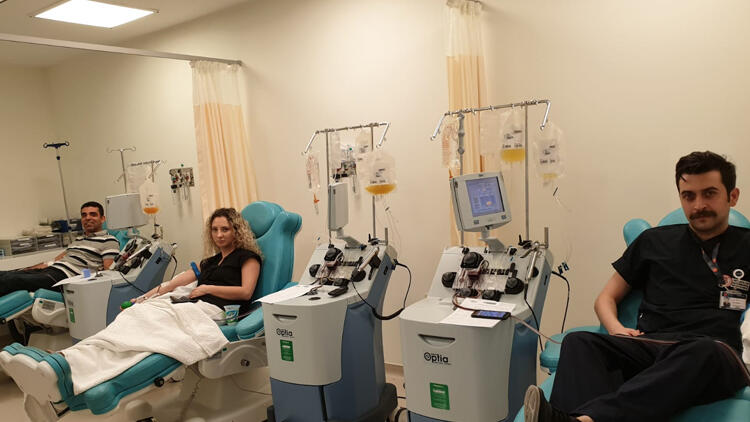
Children undergoing cancer treatment, patients requiring emergency heart surgery—every day, hundreds of patients or their loved ones helplessly share urgent blood donation appeals. Turkey's daily blood need stands at 9,000 units. Only 7,000 of these units can be met through regular donations. The remaining 2,000 units represent a bleeding wound for the country, leaving patients and their families in despair.
Sema Savaş, Chair of the Board of Directors of the Blood and Stem Cell Donors Association, said: “The Turkish Red Crescent does this work extremely well, operating with world-class technologies, but our number of regular donors is insufficient. When people share blood donation appeals on Twitter or other social media, they think the problem is solved. We have 52 million social media users. If just 10% of them became regular blood donors, Turkey’s blood shortage would be resolved.”
EVERYONE THINKS, “SOMEONE ELSE WILL GO”
Savaş, who for years has had her phone ringing day and night, tirelessly searching for donors whenever blood is needed, said: “The story behind just one unit of blood in this country is very long. We live in a country where fathers hold signs around their necks searching for blood for their children, and mothers who share their phone numbers on social media are harassed by some individuals. This happens because the number of regular donors is insufficient. People mistakenly believe social media is the solution. Everyone thinks, ‘somebody else will go.’ But who is that ‘somebody else’? Moreover, we don’t even check whether the need still exists. There’s no date on the post—you call the family, and they say, ‘Our patient passed away two years ago.’ When someone shares a post about a patient in need, they might forget to include the date, but those who see it should first verify the information, add the date if correct, share it accordingly, and remove the post once the need is met.”
BLOOD DONATION SHOULD NOT ONLY BE IN THE SPOTLIGHT DURING TERROR OR DISASTERS
Emphasizing that blood donation should not only become a topic during terror attacks or natural disasters, Sema Savaş continued:
“Blood donations decrease in winter due to colds and flu; they drop again during holidays because people are on vacation. Will we only rush to donate blood during disasters or terrorist attacks? But even then, it doesn’t solve the problem. Because the donated blood cannot be immediately given to the injured—it must go through many tests first. Blood centers become chaotic at such times. The influx of people can actually create more difficulties. The real, sustainable solution lies in maintaining sufficient blood stocks for any situation. And for that, we need to significantly increase the number of regular donors.”
“SOMETIMES WE DONATE OUR OWN BLOOD FOR OUR PATIENTS”
Prof. Dr. Barış Malbora, Pediatric Hematology Specialist from the Bone Marrow Transplantation Center at Yeni Yüzyıl University Gaziosmanpaşa Hospital, said: “Blood donation is often seen as an emergency measure. On the contrary, it is precisely the regular donations made when there is no emergency that save lives during crises.”
Prof. Dr. Malbora, speaking about looking into the eyes of families when they cannot find blood for their patients, said: “First, we check the hospital’s blood bank. If it’s not there, we check the stocks held by the Red Crescent. If it’s not there either, we find ourselves looking into the eyes of the patient’s relatives. Sometimes, we end up donating our own blood on the spot. Our patients undergoing cancer treatment have the highest need for blood products. In fact, in these illnesses, blood transfusions are as critical as chemotherapy. Sometimes, we personally donate blood for our own patients. Blood donation should not be seen as something to do only in emergencies—it must be a regular practice.”
Prof. Dr. Malbora emphasized: “I want to particularly underline this for Turkey—platelet suspension is a major problem. Platelets have a shelf life of only five days after preparation. We cannot stockpile them. Yet, platelets are cells that the body produces rapidly—someone can donate platelets once a week. Another point: my blood type is A positive. Many people think, ‘There are already plenty of A positive donors; I don’t need to donate.’ This is a serious misconception because there are just as many A positive patients in need.”
“MY BLOOD CARRIES VOLUNTARISM”
Gül Koçali (42), who has been donating blood regularly as a volunteer for nearly 15 years, said: “The first time I was called to donate blood, I was at work. There was a patient who needed their blood replaced every 6-8 months. I went and donated, and felt immense joy knowing that patient recovered. If you are healthy, the thought of someone out there needing your blood while you sit at home must be unbearable. There’s voluntarism in my blood.”
Muzaffer Bilici (46), who has donated blood regularly without interruption since 1992, said: “There was an urgent need for blood, and it was for someone from my own family—that’s how I started. Since that day, I’ve been donating continuously. If there’s an emergency, I go and donate immediately; otherwise, I visit the blood center regularly to donate. A person cannot truly understand the value of blood until it’s needed by someone they love.”
NEWS LINK: https://www.hurriyet.com.tr/gundem/kan-bagisinda-cozum-sosyal-medya-cagrilari-degil-41407129


